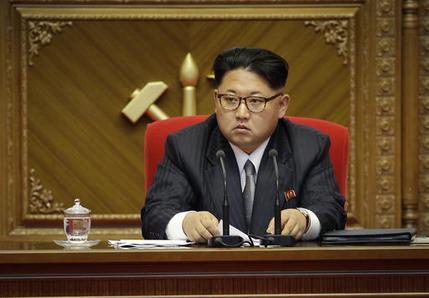-
Tips for becoming a good boxer - November 6, 2020
-
7 expert tips for making your hens night a memorable one - November 6, 2020
-
5 reasons to host your Christmas party on a cruise boat - November 6, 2020
-
What to do when you’re charged with a crime - November 6, 2020
-
Should you get one or multiple dogs? Here’s all you need to know - November 3, 2020
-
A Guide: How to Build Your Very Own Magic Mirror - February 14, 2019
-
Our Top Inspirational Baseball Stars - November 24, 2018
-
Five Tech Tools That Will Help You Turn Your Blog into a Business - November 24, 2018
-
How to Indulge on Vacation without Expanding Your Waist - November 9, 2018
-
5 Strategies for Businesses to Appeal to Today’s Increasingly Mobile-Crazed Customers - November 9, 2018
AP ANALYSIS: Questioning the stereotypes about North Korea
(WASHINGTON, D.C.) Foreign ministers for the United States, Japan and South Korea met in NY on Sunday, ahead of U.N. meetings, to discuss stepped-up measures against North Korea and expand collaboration with one another after Pyongyang’s fifth and largest nuclear test.
Advertisement
They also discussed how to ensure all countries “fully and effectively implement” Resolution 2270, as the North is engaging in an “accelerated, systematic and unprecedented campaign to develop an operational nuclear capability”.
Meeting in NY on the sidelines of the U.N. General Assembly session, Japanese Foreign Minister Fumio Kishida, U.S. Secretary of State John Kerry and South Korean Foreign Minister Yun Byung Se reaffirmed the three countries’ cooperation to achieve an early adoption of a new U.N. Security Council resolution to impose additional sanctions against North Korea.
It said that Kerry reiterated “steadfast” U.S. commitment to the defense of South Korea and Japan, “including the commitment to provide extended deterrence, backed by the full range of its nuclear and conventional defense capabilities”.
In a separate meeting, Kishida and Yun affirmed the importance of signing an agreement that would allow Japan and South Korea to exchange military intelligence, according to a Japanese official. It has said it believes sanctions are not the ultimate answer and called for a return to talks.
The North’s latest nuclear test comes eight months after its fourth nuclear device detonation in January which led the UNSC to adopt a resolution regarded as the toughest ever in March. China has expressed anger with North Korea for its biggest nuclear test but has not said directly whether it’ll support more demanding sanctions. Similar to reported “decapitation strikes” on the North Korean leadership, the KMPR plan would also target the hermit nation’s upper echelons, including leader Kim Jong Un.
He also highlighted the importance of trilateral cooperation with Tokyo and Washington and said, “As the key stake-holders in this nuclear conundrum, the three of us will continue to muster the collective will of the worldwide community”.
He added that the United States and its allies in the region would “make it clear to a reckless dictator that all he is doing through his actions is isolating his country, isolating his people and depriving his people of genuine economic opportunity”. They also discussed work in the Security Council to tighten the sanctions and the possibility of taking measures of their own to restrict revenue sources for the North’s missile and nuclear programs.
“Even if North Korea appeals for help, we don’t think the possibility is high for assistance to be given under the current situation”, ministry spokesman Jeong Joon-hee said at a press conference.
South Korea and the U.S. are slated to conduct a joint aerial exercise in October that will focus on striking North Korea’s nuclear facilities, military officials said on Monday.
North Korea’s serious human rights violations gained global spotlight on the back of a landmark report by the U.N. Commission of Inquiry (COI) released in early 2014.
Advertisement
Ranking member of U.S. Senate Foreign Relations Committee Sen.





























